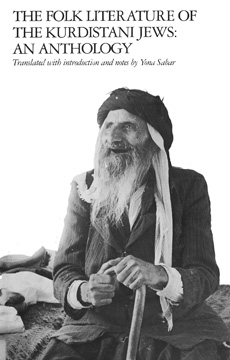| Éditeur : Yale University Press | Date & Lieu : 1982, New Haven & London |
| Préface : | Pages : 250 |
| Traduction : | ISBN : 0-300-02698-6 |
| Langue : Anglais | Format : 140x210 mm |
| Code FIKP : Liv. Ang. 3648 | Thème : Littérature |
|
Présentation
|
Table des Matières | Introduction | Identité | ||
 The folk literature of the Kurdistan Jews: an anthology | |||||
| Identité | ||||
|
This is one of a series of volumes that will be published with the support of the Judaica Series Fund established by the William P. Goldman and Brothers Foundation, Inc. The preparation of this volume was aided by a grant from the National Endowment for the Humanities. The findings, conclusions, etc. do not necessarily represent the view of the Endowment. Published with assistance from the foundation established in memory of Philip Hamilton McMillan of the Class of 1894, Yale College. Copyright © 1982 by Yale University. All rights reserved. This book may not be reproduced, in whole or in part, in any form (beyond that copying permitted by Sections 107 and 108 of the U.S. Copyright Law and except by reviewers for the public press), without written permission from the publishers. Illustrations Frontispiece Map of the major Jewish communities of Kurdistan. following page 100 Yona Gabbay, a well-known storyteller from Zakho. As a merchant who traveled throughout Kurdistan, he heard and told many folktales. He died in Jerusalem in 1972, when he was more than one hundred years old. Photograph by Stephanie Sabar (Jerusalem, 1967). The author reading a Neo-Aramaic manuscript with hakam 'Alwān Avidani. Photograph by Stephanie Sabar (Jerusalem, 1969). Sandor, a Jewish village in Iraqi Kurdistan, ca. 1934. Courtesy Field Museum of Natural History, Chicago. Girl wearing case amulet with pendants. Courtesy Field Museum of Natural History, Chicago. Sandor village schoolchildren, ca. 1934. Courtesy Field Museum of Natural History, Chicago. Man watching teapot. Courtesy Field Museum of Natural History, Chicago. Woman at a nomadic-style loom. Courtesy Field Museum of Natural History, Chicago. Page from a Neo-Aramaic manuscript; the last page of a Midrash on Běšallah (Exodus), with a colophon, copied in Nerwa in 1669 C. E. Courtesy Jewish National and University Library, Jerusalem. | ||||